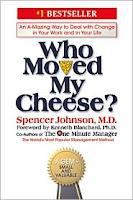Angela's Ashes by Frank McCourt
368 pages
Published 1996
Source: I own it
Malachy McCourt had barely arrived in America before he met Angela Sheehan. Soon she was pregnant and the two were "convinced" that they should marry by Angela's cousins. Cousins who ever after told her what a terrible man her husband was. They were right; Malachy McCourt was an alcoholic who was never able to keep a job for more than three weeks and frequently drank his entire pay for a week before he went home. This was the life that Frank was born into. Within a couple of years he was joined by brothers Malachy, Oliver, and Eugene and sister Margaret, the apple of her father's eye. For Margaret, their father stopped drinking and had she lived who knows how the McCourt family's life might have changed. But she didn't; Malachy started drinking more than ever and Angela sank into a deep depression. Eventually her cousins convinced the family to return to Ireland, where things went from very bad to much, much worse.
"When I look back on my childhood I wonder how I survived at all. It was, of course, a miserable childhood: the happy childhood is hardly worth your while. Worse than the ordinary miserable childhood is the miserable Irish childhood, and worse yet is the miserable Irish Catholic childhood."
A miserable childhood it was. There were more children born and more children died. McCourt's father continued his drinking ways, forcing the family to rely for years almost exclusively on the assistance of various agencies (in his defense, it played hugely against him that he was from the North living in Limerick). There was rarely much more to eat than bread and often not enough coal to boil water for tea. Frank suffered from typhoid fever and the worst case of conjunctivitis that I've ever heard of. During his three month confinement with the typhoid, he spent most of his time alone in a ward of the hospital where there were no other patients and his mother was not even allowed to visit. His life at home was so bad, that when he was finally able to return home he found himself longing for the quiet, the warmth and the cleanliness of the hospital.
"I think my father is like the Holy Trinity with three people in him, the one in the morning with the paper, the one at night with the stories and the prayers, and then the one who does the bad thing and comes home with the smell of whiskey and wants us to die for Ireland."
With the second World War going on, many of the Irish father's went to London and began sending home money to the other families on the lane, When Malachy goes to London, the McCourts finally think their luck has changed. But not one dime ever arrives from England. Not only that, but with Malachy gone, the family was no longer eligible for the assistance they had relied on for years. Now the family become more and more reliant on a family that didn't want to help and a church that kept turning its back on them.
"This is my mother, begging. This is worse than the dole, the St. Vincent de Paul Society, the Dispensary. It's the worst kind of shame, almost as bad as begging on the streets where the tinkers hold up their scabby children, Give us a penny for the poor child, mister, the poor child is hungry, missus."
I cannot imagine how any of the McCourt children survived this life. Yet survive Frank and three of his brothers did. Frank decided at fourteen to quit school, despite a passion for learning, to become a telegram boy, a job that not only helped his family survive but also allowed him to begin saving money for his eventual escape back to America.
Oh Frank McCourt, how I love this book! I read it the year it won the Pulitzer and it earned a hard to earn spot on my permanent bookshelf. Which means that, theoretically, I will someday re-read a book. But I have a hard time ever making myself do that. How could a book that's sitting on that shelf ever live up to my memory of it? This one did.
This time I was struck by the fact that McCourt frequently repeated things. Where I might have thought on the first read that this was done to effectively emphasize his points, this time I did find it excessive. Still that was the only fault I found with the book. McCourt spares no one in this book, finding fault with both of his parents, his larger family, the government, and the Catholic church. But while the book can frequently feel angry, it is more often filled with humor and compassion. McCourt brings his story to life: the malodor of the outhouse that's shared by the block but right next to the McCourt's house, the sting of the fleas, the misery of living in a house where for six months of the year, the family was forced to live on the second floor due to the flooding on the first floor. McCourt is a master of the English language and writing in dialect. I actually responded to my husband one night while reading this with an Irish accent. Back on the shelf this book will go. Someday I know I will read it again.





